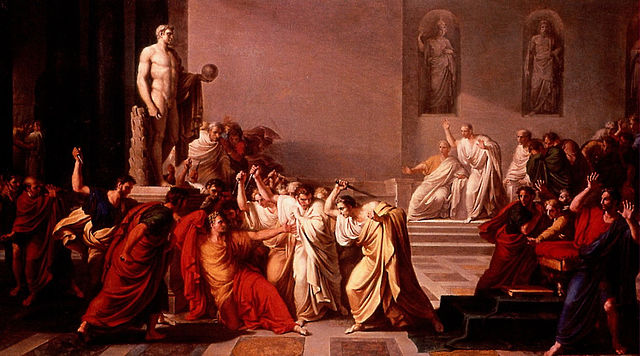*Image Credit: Wikimedia Commons Just days before a planned expedition to Parthia and weeks after being named “dictator for life,” Julius Caesar lay dying on the floor of the Roman Senate. Attacked by a group of 60 senators who called themselves “The Liberators” on March 15, 44 BCE, Caesar’s death shook up the power base in Rome for years to come. The Empire’s leadership structure would never really be the same. From about 60 BCE on, Julius Caesar slowly gained more and more influence among the contentious Roman political elite. Through a series of battles and mutually beneficial alliances, he managed to stay near the forefront of the ruling class for better than a decade — no small feat considering how willing people were to conspire against their enemies. After forcing a civil war when he crossed the Rubicon in 49 BCE, Caesar rapidly became the most powerful man in the Roman Empire. Following victories over Pompey’s armies all over southern Europe and North Africa, Caesar had become more than just a successful general: the population regarded him as a hero, a figure who unified rebellious territories during a bloody four-year conquest. With victory achieved in March 45 BCE, the Senate piled tributes on Caesar for his skill on the battlefield and success bringing order to the Empire. Upon his return to the capital in September, he was greeted by a throng of well wishers lining the streets. Behind the scenes, though, fears were beginning to run rampant a new form of government would come to exist under Caesar’s leadership. With Pompey, his only political opponent, vanquished at Pharsalus in Greece during the summer of 48 BCE, Caesar had methodically created changes in the political system of Rome. His years fighting on the frontier convinced him that centralizing authority would do wonders for the republic. Elected dictator for three straight years after his victory, Caesar could do just that — and he did, solidifying his status as the head of state once he arrived in Rome. The aggressive shift in domestic policy reminded some of Rome’s last king, Tarquin Superbus, who had been thrown out of power in 509 BCE, according to legend. In public, Caesar was very careful to draw a line between himself and the royal title, but the Roman populace continued to insist it was the truth, particularly after he received the title of “dictator for life” in early 44 BCE. With each passing day, Caesar attempted to seize more authority from the senators, adding fuel to the fires of contempt. Believing it a duty to overthrow Caesar as a potential tyrant, a handful of senators whispered among themselves about the possibility of an assassination. Marcus Junius Brutus, a favorite of the dictator, was among the leading plotters in this conspiracy of “Liberators,” working with dozens of others to help bring about the ruler’s downfall. Whatever the final decision, it would have to happen quickly: Caesar planned to leave Rome to conquer Parthia sometime in March and might be gone for months or years. As the plotters met in small groups at each other’s homes, Caesar encountered a series of ominous signs. Friends approached him with rumors of a plan to take his life. Calpurnia, his wife, started having horrifying nightmares. Even doctors, noticing the dictator was having a severe occurrence of his dizzy spells, encouraged him to ignore the invitation issued by the Senate to attend the Theatre of Pompey for some games. Egged on by Brutus, Caesar decided to watch the gladiators despite the warnings, leaving a distraught Calpurnia behind at home. Walking toward the Theatre on March 15, 44 BCE — the Ides of March — Caesar received a request from Senator Tillius Cimber to end the exile of his brother. Caesar refused, then was surprised to have Cimber grab him by the shoulders and tear his garment. Wheeling around, he saw Servilius Casca swinging a knife, narrowly avoided a killing stroke and grabbed his attacker by the arm. Convinced Caesar would exact a quick revenge, Casca screamed, “Help, brother!” Hiding in the shadows, the remaining Liberators pulled daggers from under their tunics and advanced on Caesar. Within moments, the dictator lay dead in a pool of blood on the floor of the Senate portico, the victim of 23 stab wounds. Figuring they would be welcomed as patriots, Brutus and others moved through the city shouting, “People of Rome, we are once again free!” The Liberators could not have foreseen the upheaval that would result: they had inadvertently started another civil war. Brutus and Cassius were forced to flee Italy and gathered an army in Greece. Mark Antony, Caesar’s deputy, Lepidus and Caesar’s chosen heir, Gaius Octavian, took the reins in Rome. More than a decade later, after defeating Liberator forces and destroying Mark Antony at the Battle of Actium, Octavian took on the role of Emperor as Caesar Augustus. The Liberators, so concerned with the continuation of the Senate, actually brought on the downfall of the Roman Republic by killing Caesar — there would be one authority figure in Rome until the Western Empire collapsed in the 5th century CE. Also On This Day: 1493 – Christopher Columbus arrives in Spain after his first trip to the Americas 1783 – Commander-in-Chief George Washington thwarts the Newburgh Conspiracy for a coup d’etat with an emotional speech to his fellow officers 1898 – Sir Henry Bessemer, inventor of the process for inexpensive steel manufacturing, dies in London 1939 – Nazi Germany seizes the Bohemia and Moravia, the last free regions of the former Czechoslovakia 1985 – The domain name “symbolics.com” becomes the first registered in the history of the Internet
March 15, 44 BCE – Julius Caesar is Assassinated
*Image Credit: Wikimedia Commons Just days before a planned expedition to Parthia and weeks after being named “dictator for life,” Julius Caesar lay dying on the floor of the Roman…
425
